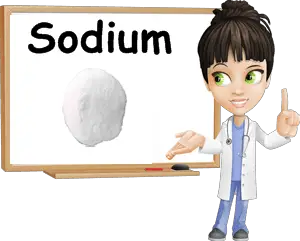What is the function of Sodium? As a mineral of dietary importance, sodium plays an important part in mineral metabolism, helping regulate body fluids. In addition to this, sodium contributes to the good functioning of the heart, supports the activity of the nervous system and improves glucose absorption. The recommended daily intake is of 120 mg of sodium. Sodium deficiency symptoms include: diarrhea, vomiting, headaches, general weakness, low blood pressure, lethargy (drowsiness, apathy, sluggishness), weight loss, confusion, dizziness, muscular irritability. Sodium deficiency can pose serious health risks, mostly due to the fact that it has direct, negative effects on the nervous system.  Sodium overdose is just as dangerous. A higher sodium intake than recommended can cause high blood pressure, swelling of the nerves belonging to the central nervous system, cerebral edema (excess fluid in the brain) and coma. Although sodium is present in our daily diet, you must be aware of the fact that it is a genuine health hazard. In time, excess sodium consumption can lead to increased risks of stomach cancer, hypertension, kidney problems and edema. It is imperative that you limit sodium consumption to the recommended daily intake if you wish to keep healthy.
Sodium overdose is just as dangerous. A higher sodium intake than recommended can cause high blood pressure, swelling of the nerves belonging to the central nervous system, cerebral edema (excess fluid in the brain) and coma. Although sodium is present in our daily diet, you must be aware of the fact that it is a genuine health hazard. In time, excess sodium consumption can lead to increased risks of stomach cancer, hypertension, kidney problems and edema. It is imperative that you limit sodium consumption to the recommended daily intake if you wish to keep healthy.
